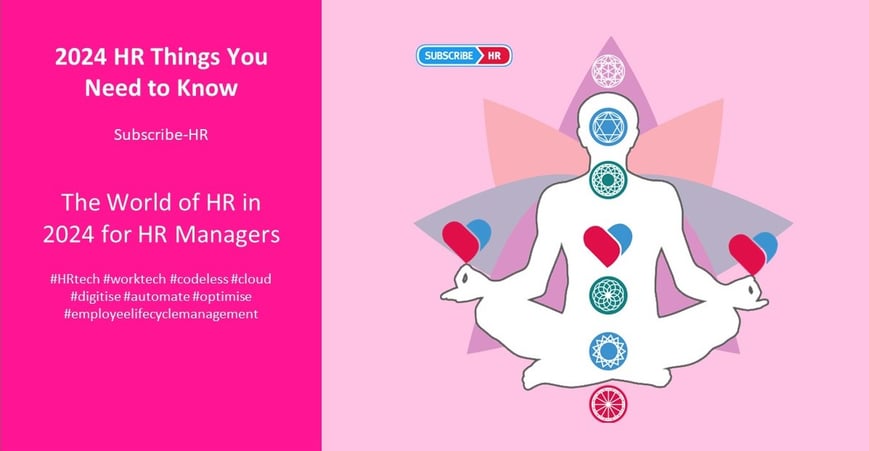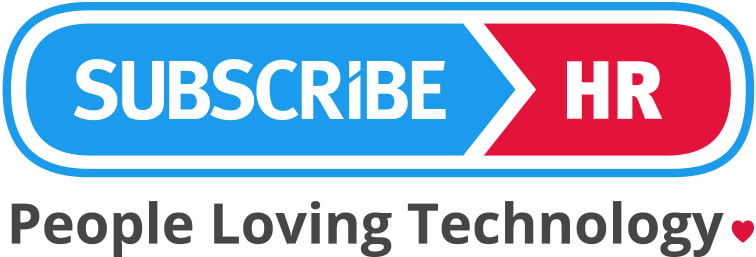Let’s face it – HR feels like it’s changing faster than it’s possible to keep up. With so many transformations happening for human resources, things can get pretty overwhelming. 🤔
That’s why we’ve taken a deep dive into all the key aspects of HR in 2024 – in this blog post, you’ll be able to have a look at everything you need to know about HR this year, minus the overwhelm! ⬇️

1. Employers need to stay relevant in HR with HR tech
The aftermath of significant global layoffs in 2023 has created a real necessity for HR leaders to continually adapt this year.
It’s actually anticipated that a whopping 92% of employers are gearing up for workforce reductions in 2024, still strongly impacted by the economic aftermath of the COVID-19 pandemic.
In these times of transformation, embracing technology has become not just a choice but a real necessity. HR leaders need to adapt to emerging technologies, with a particular focus on enhancing data literacy and communication.
The ability to interpret and leverage data is becoming a cornerstone of HR practices in 2024. The conventional approach to decision-making is evolving, with HR leaders increasingly harnessing the power of data insights. Some examples of this in 2024 are:
➡️ Predictive analytics for talent acquisition
➡️ Using advanced analytics for employee engagement surveys
➡️ Performance metrics for training and development
➡️ Using demographic data for workforce planning
➡️ Leveraging retention strategies for turnover analytics
➡️ Diversity and inclusion metrics
Another crucial element to focus on with HR tech in 2024 is automation. HR teams are now more than ever automating routine and time-consuming tasks to redirect their focus toward strategic initiatives. This not only enhances overall efficiency but also positions HR as a more agile and responsive function within the organisation 👍
Generative AI also holds the promise of transforming HR processes in unprecedented ways. From talent acquisition to employee engagement, generative AI presents opportunities for HR leaders to pioneer innovative approaches and elevate the employee experience.
Key takeaway:
- Global layoffs in 2023 require continual adaptation for HR leaders in 2024
- Embracing technology is not just a choice but a necessity in the current landscape
- The ability to interpret and leverage data becomes a cornerstone of HR practices in 2024
- Automation also becomes crucial in 2024
- HR leaders explore generative AI, anticipating transformative impacts on HR processes

2. The employer-employee relationship is changing
In 2023, we witnessed widespread employee strikes calling for better pay and improved working conditions. This year's echoes of these upheavals are a real need for more symbiotic and respectful employer-employee relationships. 🤝
Employers now not only need to address immediate concerns but also redefine the underlying structures that govern the employer-employee bond. This means fostering an environment where trust, transparency, and mutual respect are a solid foundation.
We’re noticing that tech is playing an increasingly pivotal role in shaping workplace experiences, but it’s important to keep in mind that it can’t replace a strong, interpersonal relationship between employers and employees. Virtual interactions, digital platforms, and automated processes enhance efficiency, but the core of a meaningful employer-employee relationship lies in authentic, human connections. 👍
Proactive listening is also required so that organisations can understand the evolving needs and aspirations of their workforce. Engaging in open, two-way communication channels allows HR to gain insights, and build trust.
It’s also important that HR authentically responds to employee concerns, acknowledging challenges, implementing changes, and communicating transparently ✅
Key takeaways:
- Widespread strikes in 2023 prompt a need for more symbiotic employer-employee relationships in 2024
- Employers must address immediate concerns and redefine structures for trust, transparency, and mutual respect in the employer-employee bond
- Proactive listening is crucial for HR to understand evolving workforce needs
- HR's authentic responses to employee concerns, acknowledging challenges, implementing changes, and transparent communication are incredibly important for fostering a genuine work environment

3. There’s a new role for managers in the era of hybrid working
The new hybrid work model comes with a caveat — managers have less visibility into the day-to-day activities of their remote teams. This shift demands a departure from traditional methods of oversight and requires new strategies for effective management.
The rigid hierarchical management models of yesterday no longer align with the evolving work environments. This era of hybrid work thrives on flexibility, collaboration, and autonomy, leaving command-and-control structures aside in favour of adaptable and dynamic leadership.
With that in mind, HR professionals need to reframe the mindset of managers, steering them toward a more collaborative, adaptive, and employee-centric approach. This involves equipping managers with the skills and tools necessary to thrive in the hybrid landscape, which can look like:
- Utilising digital collaboration platforms
- Virtual leadership training
- Data-driven decision-making training
- Remote employee engagement tools
- Flexible leadership models
- Conflict resolution in virtual settings
- Cyber-security awareness
- Technology integration workshops
In 2024, the focus is shifting from micro-management to empowerment. Managers are encouraged to empower their teams, fostering an environment where individuals can thrive independently.
However, it’s important to keep in mind that the implementation of new policies often triggers disengagement in employees. Acknowledging this, HR professionals can collaborate with managers to address staff disengagement caused by policy changes, ensuring that shifts in work dynamics are communicated transparently and that concerns are promptly addressed ✅
Shifting the narrative away from an obsession with returning to the office, HR and management teams focus on building a model that blends the best of both worlds. This entails understanding that productivity and collaboration can thrive in various settings, be it remote, in-office, or a hybrid combination.
Another thing HR teams can do to help adapt to new changes this year is to keep their focus on personal connections. Encouraging person-to-person connections, whether virtual or in person, becomes a cornerstone for building a cohesive and connected team, fostering a sense of belonging and shared purpose.
Key takeaways:
- The hybrid work model reduces managers' visibility into remote teams, necessitating new strategies for effective management
- Rigid hierarchical models are outdated; hybrid work requires adaptable and dynamic leadership focused on flexibility, collaboration, and autonomy
- HR professionals need to reframe managers' mindsets towards collaboration and adaptability
- Managers need skills such as digital collaboration, virtual leadership, data-driven decision-making, remote employee engagement, flexible leadership, conflict resolution in virtual settings, and cyber-security awareness
- In 2024, the managerial focus shifts from micro-management to empowerment, creating an environment where teams can thrive independently
- Shifting the narrative from an office-centric focus, HR and management build a model blending remote, in-office, and hybrid settings for optimal productivity and collaboration
4. Diversity and Inclusion is no longer an option, it’s a requirement
This year, Diversity, Equity, and Inclusion (DEI) are transcending from being optional initiatives to becoming indispensable components of organisational success.
The journey toward achieving diversity and inclusion slowed down amid economic uncertainties in 2023. However, the imperative to prioritise DEI has only intensified. As organisations navigate challenges, there's a growing awareness that fostering diverse perspectives is not just a moral imperative but also a strategic necessity for long-term viability.
Organisations must recommit to their DEI efforts, recognising them as integral to their core values and business objectives. This involves revisiting and reinforcing commitment statements, setting measurable goals, and holding leadership accountable for creating an inclusive workplace that mirrors the diversity of the world outside its walls.
Leveraging technology becomes a catalyst for accelerating progress in DEI. From AI-driven recruitment tools to analytics ensuring pay equity, technology offers solutions to identify and rectify biases, ultimately fostering a more inclusive workplace. Virtual reality (VR) and augmented reality (AR) applications can also be employed to simulate diverse scenarios, enhancing empathy and understanding among employees.
Organisations need to proactively change defaults in their systems and processes to create a sense of belonging for everyone. This involves questioning assumptions, dismantling unconscious biases, and intentionally designing policies and practices that amplify inclusivity. From recruitment practices to project team compositions, inclusivity should be the default, not an afterthought. 🙌
Key takeaways:
- In 2024, Diversity, Equity, and Inclusion (DEI) shift from optional initiatives to indispensable components for organisational success
- Organisations need to recommit to DEI, integrating it into core values and business objectives, with measurable goals and leadership accountability for inclusivity
- Leveraging technology accelerates DEI progress, utilising AI-driven recruitment tools, analytics for pay equity, and VR/AR applications for empathy-building scenarios
- Proactively changing defaults in systems and processes is essential for creating a sense of belonging for everyone. This involves questioning assumptions, dismantling biases, and designing policies that amplify inclusivity

5. Talent attraction and retention efforts are crucial
The rapid evolution of technology and job roles dictates a paradigm shift in how organisations approach talent development.
With over half of the global workforce requiring reskilling or upskilling in the next few years, organisations must embrace proactive initiatives to equip their teams with the skills needed for the future. This involves investing in continuous learning programs, fostering a culture of curiosity, and aligning training with emerging industry trends.
While talent acquisition remains a pivotal aspect, the spotlight now shifts to talent management. Nurturing and retaining existing talent take precedence over the perennial quest for new recruits. Organisations recognize the value of cultivating and advancing the skills within their current workforce, steering away from a revolving door of talent to building a loyal, skilled, and committed employee base.
Internal retention emerges as a critical focus area, urging organisations to create environments that inspire loyalty and commitment. Recognizing the wealth of institutional knowledge and expertise residing within current employees, organisations are compelled to implement strategies that not only retain but also elevate their internal talent pool. This entails career growth opportunities, mentorship programs, and transparent communication about future prospects.
The era of informed decision-making unfolds as organisations leverage data for workforce planning. Analysing data sets provides insights into the skills landscape of the current workforce, allowing HR leaders to make strategic decisions about reskilling initiatives, skills assessment, and crafting career pathways. This data-centric approach ensures that organisational talent aligns with the evolving needs of the business.
Traditional Learning Management Systems are undergoing a metamorphosis to align with the dynamic needs of the changing workforce. As organisations embrace remote and hybrid work models, LMS needs to adapt. This involves creating agile, personalised learning paths, incorporating microlearning modules, and providing on-demand access to educational resources. The adaptive LMS becomes a cornerstone for empowering employees to chart their learning journey seamlessly this year. 🙌
Key takeaways:
- While talent acquisition remains crucial, the focus shifts to talent management, emphasising nurturing and retaining existing talent over constantly seeking new recruits
- Creating environments that inspire loyalty and commitment becomes critical, with a focus on retaining and elevating the internal talent pool through career growth opportunities, mentorship programs, and transparent communication
- Traditional LMS is undergoing a transformation to align with remote and hybrid work models

6. Wellness at work is taking on a whole new dimension
The global workforce is grappling with stress levels reaching historic highs, posing a significant challenge to individual health and organisational productivity.
While digital transformation ushers in unprecedented benefits, the rapid pace at which it unfolds has become a real double-edged sword. The embrace of technology, coupled with the demands of an always-on work culture, is contributing to these heightened stress levels.
Given the situation, organisations need to strike a delicate balance, leveraging digital advancements without compromising the mental health and wellbeing of their workforce.
In fact, the emphasis is shifting towards integrating wellbeing into transformation initiatives. Rather than viewing well being as an ancillary consideration, organisations are now weaving it into the fabric of their strategic transformations for lasting and sustainable change.
Mental health is not just a facet of HR policies; it's an integral part of the overall organisational strategy. HR leaders are championing initiatives that stigmatise mental health discussions, provide resources for support, and ensure employees have access to the tools necessary to navigate the complexities of modern work life.
The focal point shifts to tackling burnout at the middle management level, where over half of managers report feeling burnt out. Recognising the pivotal role middle managers play, organisations are implementing targeted strategies to alleviate stress, promote work-life balance, and fortify the mental resilience of this critical stratum within the organisational hierarchy.
Stressed middle management has a cascading effect on junior team members. Acknowledging this ripple effect, HR teams are devising interventions that not only support middle managers but also create a conducive environment for junior team members to thrive.
In response to the burgeoning mental health challenges, HR teams are stepping up to provide robust support mechanisms. This involves not only offering mental health tools but also ensuring consistent training on stress management, resilience building, and fostering a workplace culture that prioritises mental wellbeing. ☯️
Key takeaways:
- Global workforce stress reaches historic highs due to factors like the ongoing pandemic and the relentless pace of the digital era
- Organisations must balance digital advancements without compromising employee mental health
- Organisations integrate well being into transformation initiatives, recognising its crucial role in employee and organisational success
- Mental health is now integral to the overall organisational strategy, destigmatized by HR leaders who champion initiatives and provide tools for navigating modern work complexities
- Stressed middle management has a cascading effect on junior team members, prompting HR interventions to create a conducive environment for their success

7. Succession planning needs to be a part of your strategy
As the professional landscape undergoes a generational shift, organisations stand at the cusp of a transformative moment in leadership. In the wake of baby boomers gracefully exiting the workplace, there’s a real need for a meticulous and forward-looking succession plan.
Baby boomers are retiring, creating vacuums in leadership roles that demand strategic foresight and proactive planning. Succession planning ceases to be a mere organisational formality; it is a strategic imperative to ensure continuity and sustained success.
The critical assessment of individuals poised to ascend to leadership roles is central. HR teams and organisational leaders must meticulously evaluate whether there are individuals within the ranks ready to shoulder the responsibilities of leadership. This assessment goes beyond skill matching; it encompasses a holistic evaluation of leadership potential and cultural alignment.
Succession planning transcends the conventional focus on skill sets to spotlight the development of leaders who embody empathy, emotional intelligence, and a genuine connection with their teams. The future leader is one who understands the human aspect of management and can navigate complexities with compassion.
The identification of future leaders is an art as much as it is a science. Beyond assessing current competencies, a forward-looking succession plan hones in on attributes like attitude, a willingness to learn, and cultural fit. These elements serve as beacons, guiding the organisation towards leaders who not only fit the present requirements but are poised to evolve with the dynamic demands of the future.
And succession planning is not about filling gaps; it's about cultivating a vision for tomorrow's leaders. It involves mentorship, tailored development programs, and a commitment to instil the values and principles that define the organisation's leadership culture.
Key takeaways:
- Organisations face a transformative leadership moment as baby boomers exit, making succession planning crucial for continuity and sustained success
- HR teams assess individuals beyond skill matching, evaluating leadership potential and cultural alignment for effective succession planning
- Identifying future leaders is an art and science, considering attitude, willingness to learn, and cultural fit alongside current competencies

8. HR tech is more important than ever
The challenges of the contemporary professional landscape demand sophisticated solutions, and HR leaders find themselves under heightened pressure to make judicious choices in technology adoption. The right HR tech can be a transformative force, streamlining processes, enhancing efficiency, and fortifying the strategic impact of HR functions.
But in this difficult economic landscape, HR leaders are tasked with a dual responsibility: not only selecting technologies that align with organisational goals but also justifying these investments through clear usage and value metrics.
Modern HR tech solutions must not only provide clear usage metrics but also articulate a compelling value proposition. HR leaders are seeking technologies that not only address immediate challenges but also contribute tangibly to long-term strategic objectives.
Additionally, the year 2024 heralds a phase of experimentation with HR tech. Organisations are exploring innovative solutions, anticipating a better understanding of technology nuances, and striving for seamless integration into daily HR practices. This experimentation is about aligning tech initiatives with the evolving needs of the workforce and the broader organisational ecosystem. 👍
Key takeaways:
- HR leaders seek technologies that provide clear usage metrics and a compelling value proposition, contributing to both immediate challenges and long-term strategic objectives
- HR tech addresses persistent challenges like organisational culture, succession planning, DEI, and hybrid work models
- Forward-thinking organisations leverage technology for tailored solutions, moving beyond one-size-fits-all approaches
💡 Want more HR tech resources? Check out the Subscribe-HR blog – we’ve got hundreds of valuable HR explorations to help you navigate 2024!

